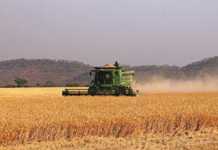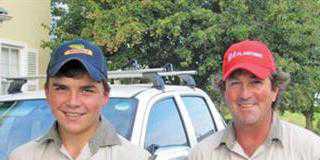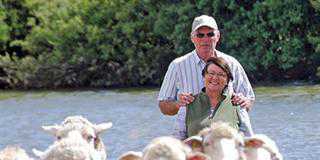Thirty-nine-year-old Maphale Moloi was born on a farm in Fouriesburg in the eastern Free State, where he used to help with chores on weekends and holidays. He left to finish matric in Qwa Qwa but returned home thereafter. “I love this area and I wanted to farm here. So I started out at the location with just two head of cattle.” Maphale then slowly increased his herd, mostly on communal land.
Expanding with a little help
But it was only in 2005 that he made real progress when a local commercial farmer, David Exley, donated 30ha of land so that he could plant maize. “He said that he saw I was interested in farming and he wanted to help me.’’ By 2008, Maphale was farming on a total of almost 400ha, including arable land owned by the Dihlabeng Local Municipality. He harvested maize at an average yield of 4,4t/ha on 103ha and wheat at an average of 2,6t/ha on 35ha. He now also runs 38 beef cows serviced by Bonsmara bulls sourced from a local stud breeder.
He owns none of the land, but rents more as he expands. This is made possible by reliable cash flow from his subsidiary business of selling wood and coal to customers during the bitterly cold eastern Free State winters. He stresses that a sideline business is crucial to fall back on in lean times and that access to land is not enough – knowledge of how to produce from it is critical. Therefore, as a member of Grain SA, he completed a number of courses offered by the organisation and also belongs to a local study group called Disweshwe tsa Dikorong.
Mentorship, red tape and theft
“When I was young, I thought farming was easy, but now I see it is difficult,” Maphale admits. “It is a process of learning and not as easy as people think. I am very grateful for the mentorship I have received.” He is critical of Land Affairs, which allows unskilled farmers to settle on high-potential soil. “A really big problem is that people don’t have the knowledge, but they think they can do it. People who are given land must have the right skills and training. Land Affairs must evaluate them and they must attend courses and register with study groups. If this is not done, we will have a food shortage. I’m telling you, starvation is coming!”
His frustration is no doubt fuelled by his inability to access land from Land Affairs, despite his proven credentials and having identified at least eight willing sellers in the region. “I spoke to the farmers, went to the agents and Land Affairs, but I couldn’t come right. I don’t know what more to do. We sometimes wait for up to five months and nothing happens. Then the farmer sells to another farmer. But I understand – they need the money and they have their own problems.”
Another major challenge for Maphale is theft. He had to stop farming with sheep because of theft, but now thieves are targeting his maize. “When we go out to harvest, we sometimes go for 500m without harvesting anything. Then we catch thieves with up to 50 bags of maize that belong to me, we take them to the police and they ask me how I can prove the maize is mine. You can’t become a commercial farmer in a situation like this!”
But Maphale’s goal remains to become a commercial farmer, no matter the odds stacked against him. “You need to have a love of the soil, you need to be passionate, patient and above all, you have to persevere,” he says with conviction.
Contact Maphale Moloi on 073 6944854 or 073 2559045.













